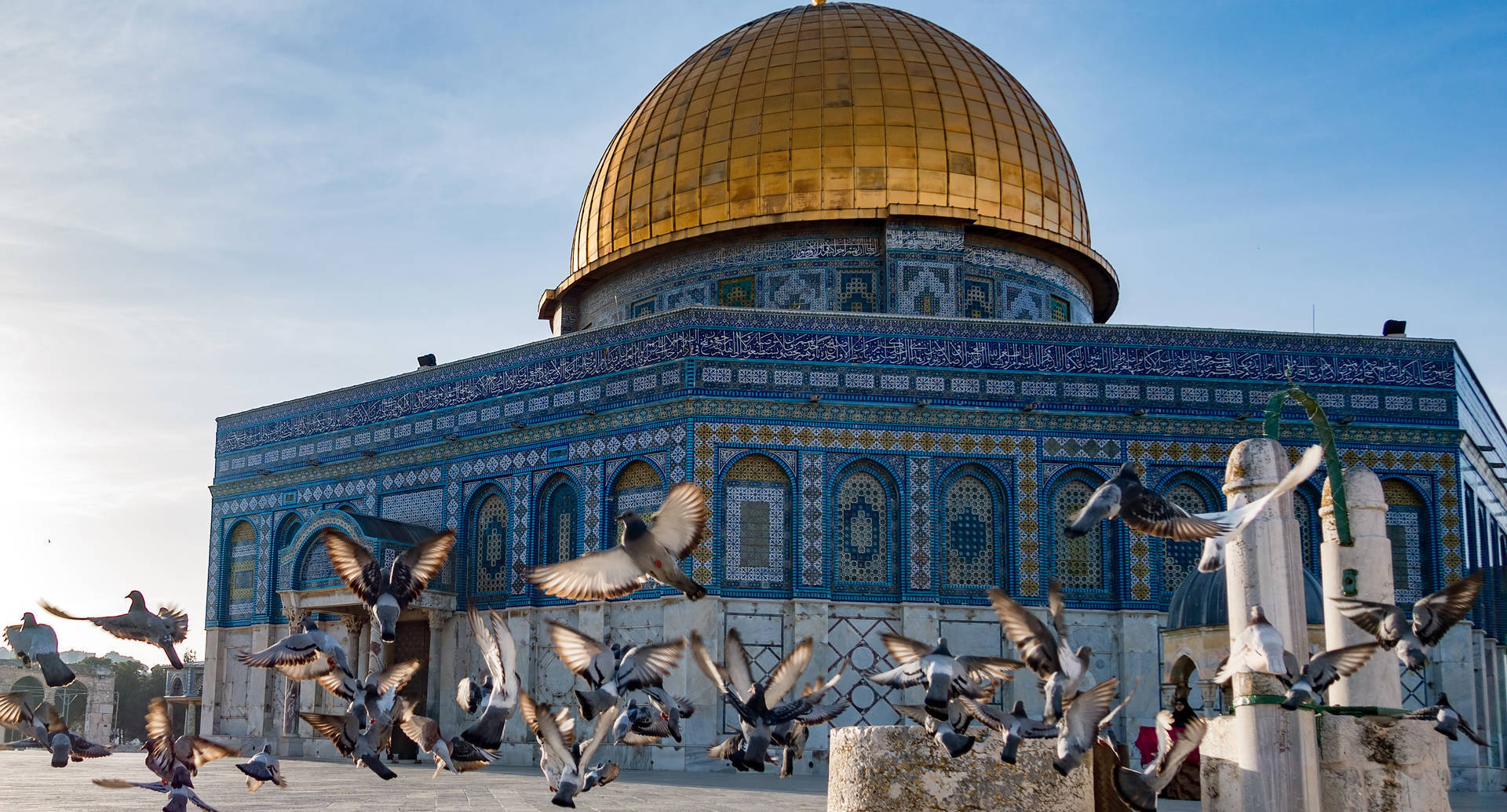
Palestine, a region steeped in rich history and complex geopolitical dynamics, has long been at the center of international attention. The state of Palestine is situated in the Middle East, between the Mediterranean Sea and the Jordan River. It is home to a diverse population and a land that holds significant religious and cultural significance for many major faiths.
With a tumultuous history marked by centuries of conquests and conflicts, modern-day Palestine continues to face numerous challenges in its pursuit of statehood recognition and self-determination. From ancient archaeological sites to bustling cities, Palestine offers a vibrant tapestry of landscapes, traditions, and customs.
In this article, we will delve into 43 fascinating facts about the Palestine state, shining a light on its history, culture, geography, and people. Let’s embark on a journey to uncover the intriguing facets of this land that has captured the attention of the world.
Key Takeaways:
- Palestine, a country in the Middle East, has a rich culture, diverse landscape, and a resilient population. Its people seek justice and self-determination, inspiring hope and solidarity worldwide.
- The Palestinian cuisine, arts, and traditions reflect the nation’s vibrant heritage. Despite challenges, Palestinians celebrate their culture, demand the right of return, and continue to pursue statehood.
Palestine is a country located in the Middle East.
Palestine is situated in the eastern part of the Mediterranean region, bordered by Israel to the east and the Mediterranean Sea to the west.
The official languages of Palestine are Arabic and English.
Arabic is the primary language spoken by the majority of the population, while English is commonly used in business and education.
Palestine has a rich cultural heritage.
The country’s cultural heritage is a blend of Arab, Islamic, and Mediterranean influences, manifested in its traditions, music, cuisine, and art.
Jerusalem is the capital city of Palestine.
Jerusalem, one of the oldest cities in the world, holds significant religious and historical importance for Muslims, Christians, and Jews.
The majority of Palestinians practice Islam.
Islam is the predominant religion in Palestine, with the majority of the population identifying as Muslims.
Palestine has a diverse and beautiful landscape.
The country is characterized by its varied landscape, including fertile valleys, rugged mountains, and stunning coastline along the Mediterranean Sea.
The olive tree is a symbol of Palestine.
Olive trees have deep cultural and historical significance in Palestine, representing peace, resilience, and connection to the land.
The Dead Sea, the lowest point on Earth, is bordered by Palestine.
The Dead Sea, known for its high salt concentration and therapeutic properties, forms part of the border between Palestine and Jordan.
Palestine has a vibrant arts and music scene.
From traditional folk music to modern art galleries, Palestine’s creative expression is celebrated and contributes to the cultural fabric of the country.
The Palestinian flag features three colors: red, white, and black.
The flag is a powerful symbol of Palestinian identity, with the colors representing various aspects of the nation’s history and aspirations.
The West Bank and Gaza Strip are two major territories of Palestine.
The West Bank, including East Jerusalem, and the Gaza Strip are two regions where a significant portion of the Palestinian population resides.
Palestine is recognized as a non-member observer state by the United Nations.
In November 2012, Palestine gained non-member observer state status at the UN General Assembly, enhancing its international recognition.
The Palestinian Authority governs parts of the West Bank.
The Palestinian Authority is an interim self-governing body established to administer civil affairs in parts of the West Bank under the Oslo Accords.
The economy of Palestine is primarily based on agriculture, manufacturing, and services.
Despite numerous economic challenges, agriculture, manufacturing industries, and service sectors contribute to Palestine’s economy.
The Palestinian people have a long history of resilience and determination.
Throughout decades of conflict, Palestinians have shown remarkable resilience and determination in pursuing their aspirations for self-determination and statehood.
The United Nations Relief and Works Agency for Palestine Refugees in the Near East (UNRWA) provides support to Palestinian refugees.
UNRWA offers essential services, including education, healthcare, and humanitarian aid, to Palestinian refugees and their descendants.
The Palestinian cuisine is known for its delicious flavors and unique dishes.
Mouthwatering dishes like falafel, hummus, and maqluba are popular in Palestinian cuisine, reflecting the region’s culinary traditions.
The Dome of the Rock is an iconic Islamic shrine located in Jerusalem.
The Dome of the Rock is a magnificent architectural masterpiece and a significant religious site for Muslims worldwide.
The Palestinian cause has garnered support from various countries and international organizations.
Many nations and organizations have expressed solidarity with the Palestinian people and endorsed their right to self-determination.
Palestine is home to several ancient archaeological sites.
Rich in history, Palestine hosts numerous archaeological sites such as Jericho, Hebron, and Bethlehem, showcasing the country’s ancient roots.
Palestinian embroidery is a cherished cultural tradition.
Embroidery plays a vital role in Palestinian heritage, with intricate and colorful designs adorning traditional clothing and handicrafts.
The Palestinian diaspora stretches across the globe.
Due to historical events and conflict, many Palestinians have migrated to different parts of the world, forming a significant diaspora community.
The Balfour Declaration of 1917 influenced the history of Palestine.
The Balfour Declaration, issued by the British government, expressed support for the establishment of a national home for the Jewish people in Palestine.
Palestinian literature and poetry have made significant contributions to Arabic literature.
Palestinian writers and poets have produced remarkable works, reflecting the collective experiences, struggles, and aspirations of the Palestinian people.
The Nakba of 1948 was a pivotal event in Palestinian history.
The Nakba, meaning “catastrophe” in Arabic, refers to the mass displacement and expulsion of Palestinians during the establishment of the state of Israel in 1948.
The Palestinian National Authority was established in 1994.
Following the Oslo Accords, the Palestinian National Authority was created to govern Palestinian-majority areas in the West Bank and Gaza Strip.
Palestinians celebrate the annual Nakba Day on May 15th.
On Nakba Day, Palestinians commemorate the displacement and loss experienced during the establishment of Israel in 1948, reaffirming their right of return.
The Palestinian political landscape consists of various factions and parties.
From Fatah to Hamas, different political factions play a role in shaping the Palestinian political scene and promoting their respective agendas.
The Great March of Return protests took place in Gaza.
The Great March of Return demonstrations, organized by Palestinians in Gaza, aimed to raise awareness of the right of return for Palestinian refugees.
UNESCO has recognized several Palestinian sites as World Heritage Sites.
Sites such as the Old City of Jerusalem and the birthplace of Jesus in Bethlehem have been granted World Heritage status by UNESCO.
The Separation Barrier or “Wall” divides parts of the West Bank.
The Israeli-built Separation Barrier, viewed by Palestinians as a symbol of occupation, restricts movement between different areas of the West Bank.
The Palestinian economy faces challenges due to restrictions on movement and access.
Israeli checkpoints, settlements, and other measures significantly impact the Palestinian economy, hindering growth and development.
The Palestinian national football team represents Palestine in international competitions.
The national football team serves as a symbol of unity and national pride for the Palestinian people, despite the challenges faced by athletes living under occupation.
The Gaza Strip is densely populated and faces severe humanitarian challenges.
The blockade imposed on the Gaza Strip has led to high unemployment rates, limited access to basic services, and a difficult living environment for its residents.
Palestinian folklore dances, such as the Dabke, are a vibrant part of cultural celebrations.
The energetic Dabke dance, characterized by synchronized footwork, is performed on special occasions, expressing joy, unity, and pride.
Palestine has a rich agricultural heritage.
The fertile lands of Palestine have nurtured generations of farmers, producing a variety of crops including olives, citrus fruits, and vegetables.
Palestinian art is a powerful medium for storytelling and resistance.
Artists use their creative talents to depict the Palestinian experience, shedding light on social, political, and cultural aspects of life under occupation.
The right of return is a fundamental demand of the Palestinian people.
Palestinians assert their right to return to their homes and lands from which they were forcibly displaced in 1948 and subsequent conflicts.
Palestine has a youthful population.
A significant percentage of the Palestinian population is under the age of 30, representing a vibrant and dynamic segment of society.
Palestinian handicrafts showcase traditional craftsmanship and artistic skills.
From intricate embroidery to delicate pottery, Palestinian handicrafts embody cultural heritage and provide livelihoods for artisans.
The olive harvest is an important cultural event in Palestine.
Every year, Palestinians come together to celebrate the olive harvest season, showcasing the significance of this staple crop in their lives.
The Arab League has consistently supported Palestine’s quest for statehood.
The Arab League, consisting of Arab countries, has consistently voiced its support for the Palestinian cause and advocated for the establishment of an independent Palestinian state.
The resilience and determination of the Palestinian people inspire hope and solidarity worldwide.
Despite the challenges they face, Palestinians continue to seek justice, equality, and the realization of their right to self-determination, serving as a source of inspiration for people around the globe.
Conclusion
In conclusion, the state of Palestine is a complex and historically significant region. It has a rich cultural heritage and deep roots in history. Palestine has faced numerous challenges and conflicts, but it is a resilient nation that has continued to strive for self-determination and recognition. With its diverse landscapes, vibrant cities, and a strong sense of identity, Palestine offers a unique and enriching experience for visitors.
FAQs
1. What is the history of Palestine?
The history of Palestine dates back thousands of years, with archaeological evidence showing human presence in the region as early as the Paleolithic era. Throughout its history, Palestine has been inhabited by various civilizations, including the Canaanites, Israelites, Romans, Byzantines, Arabs, Crusaders, Ottomans, and British.
2. Is Palestine a recognized country?
The recognition of Palestine as a sovereign state is a complex and ongoing issue. While many countries and international organizations recognize Palestine as a state, it still does not have universal recognition. The United Nations General Assembly passed a resolution in 2012 granting Palestine non-member observer status.
3. What are the major cities in Palestine?
Some of the major cities in Palestine include Jerusalem, Ramallah, Bethlehem, Nablus, and Hebron. Each city has its own unique cultural, historical, and religious significance.
4. What is the status of the Israeli-Palestinian conflict?
The Israeli-Palestinian conflict is a complex and deeply rooted dispute over land, borders, and self-determination. It has caused significant political and humanitarian challenges for both Israelis and Palestinians. Numerous efforts have been made to find a peaceful solution, but a lasting resolution is yet to be achieved.
5. What are some famous tourist attractions in Palestine?
Palestine is home to several famous tourist attractions, including the Dome of the Rock in Jerusalem, the Church of the Nativity in Bethlehem, the ancient city of Jericho, and the historical town of Hebron. Additionally, the Palestinian countryside offers beautiful landscapes and hiking opportunities.
Palestine's rich history, vibrant culture, and natural beauty make it a fascinating country to explore. If you're curious to learn more about Palestinian leadership, consider reading about the intriguing life of Mahmoud Abbas, President of the Palestinian Authority. For a deeper look into one of Palestine's most significant cities, check out 40 facts about Hebron, a key city in the West Bank. And if you're in the mood for some lighthearted trivia, don't miss our article on 11 fun facts about Palestine that will pique your interest and leave you wanting to discover more about this captivating nation.
Was this page helpful?
Our commitment to delivering trustworthy and engaging content is at the heart of what we do. Each fact on our site is contributed by real users like you, bringing a wealth of diverse insights and information. To ensure the highest standards of accuracy and reliability, our dedicated editors meticulously review each submission. This process guarantees that the facts we share are not only fascinating but also credible. Trust in our commitment to quality and authenticity as you explore and learn with us.


